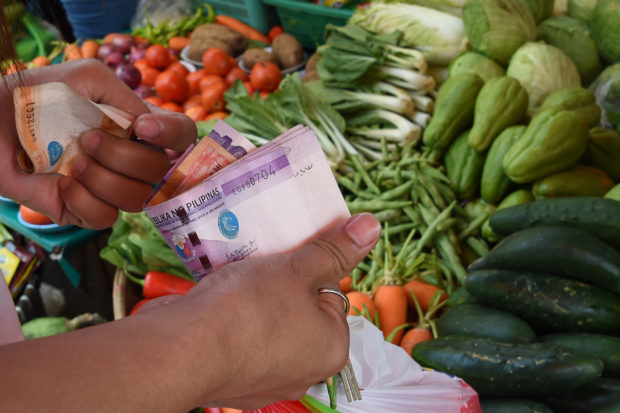Economists: Inflation further eased in July

AFP
MANILA, Philippines–Inflation likely further eased in July and possibly fell to levels unseen since 2016 thanks to stable food prices and base effects.
Among the 12 economists polled by the Inquirer last week, the lowest forecast for July headline inflation was 2.2 percent year-on-year—the same rate of increase in prices of basic commodities was last posted in December 2016.
The government will release July inflation data on Tuesday (Aug. 6).
The top end of forecasts was 2.6 percent, which would be the lowest since the same rate was recorded in August 2017.
Bank of the Philippine Islands vice president and chief economist Emilio S. Neri Jr., and Capital Economics Asia economist Alex Holmes shared the lowest projection of 2.2 percent, which the latter attributed to “continued declines in rice prices.”
Six economists—ANZ Research economist Mustafa Arif, Ateneo de Manila University economics professor Alvin P. Ang, Barclays’ Angela Hsieh, Maybank economist Zamros Bin Dzulkafli, Rizal Commercial Banking Corp.’s Michael L. Ricafort, and Security Bank Corp. assistant vice president and economist Robert Dan J. Roces—projected 2.3 percent.
“On a sequential basis, food and transport prices are expected to have contributed positively to inflation while lower electricity tariffs likely provided some offset. Despite this sequential increase, annual inflation likely fell due to a high base effect,” Arif explained.
To recall, headline inflation in July last year was 5.7 percent, hence a high base.
For his part, Zamros partly attributed his forecast to a “relatively stronger peso against the US dollar” as the domestic currency closed July at 50.89:$1, stronger than 51.233 to the greenback at end-June.
Hsieh also pointed to “benign” fuel prices.
Banco De Oro Unibank Inc. chief market strategist Jonathan L. Ravelas, ING Bank Manila senior economist Nicholas Antonio T. Mapa, and Nomura economist Euben Paracuelles had the same forecasts of 2.4 percent.
Moody’s Analytics economist Katrina Ell had the highest July inflation projection of 2.6 percent, although still lower than June’s 2.7 percent.
Given “cooler” consumer prices, “the door is wide open for the BSP [Bangko Sentral ng Pilipinas] to continue with interest rate cuts,” Ell said.
The BSP’s policy-making Monetary Board will tackle the monetary policy stance on Thursday (Aug. 8).
Last month, the Cabinet-level Development Budget Coordination Committee (DBCC) cut its inflation forecast for 2019 to 2.7-3.5 percent from 3-4 percent previously “due to the government’s decisive steps to stabilize the general price level.”
